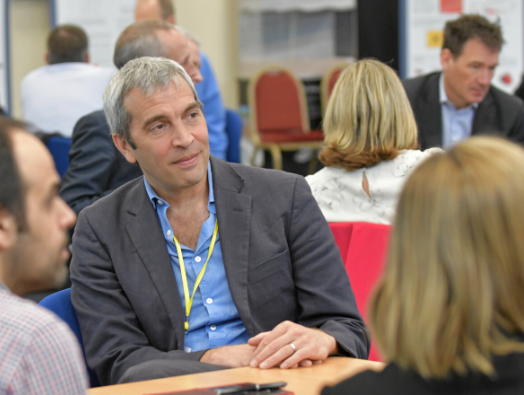Professor Ben Davis has been awarded the Davy medal from the Royal Society.
Professor Davis, of the Rosalind Franklin Institute and University of Oxford, was awarded the medal for inventing powerful chemical methods that directly manipulate complex biological molecules, enabling elucidation and control of biological function and mechanism in vitro and in vivo, beyond the limits of genetics.
On receiving this award, Professor Davis said: “It’s deeply humbling to receive this medal, given the people who have received it before, several of whom are personal heroes for me. In essence, it’s a testament to the drive and hard work of all the talented people I have been lucky enough to work with. I would like to thank them for their outstanding work, ambition and passion for science. Of course, too, this work would also not have been possible without the support of many key partners including UKRI and the EU.”

Professor Davis completed his undergraduate degree and PhD at the University of Oxford. During this time, he learnt the beauty of carbohydrate chemistry under the supervision of Professor George Fleet. Professor Davis’ current research at the Franklin focuses on the chemical understanding and exploitation of biomolecular function, with an emphasis on proteins and the potential protein editing.
Dr Vivienne Cox, Chair of the Rosalind Franklin Institute, congratulated Ben on behalf of the institute “Ben is certainly an outstanding scientist in his field and this award is truly well deserved. I believe under Ben’s leadership, we will see the Next-Generation Chemistry theme at the Franklin excel, delivering outstanding discoveries and technologies over the coming years.”
The Davy Medal is awarded to an outstanding researcher in the field of chemistry. The medal is named after Humphry Davy FRS, the chemist and inventor of the Davy Lamp.
This annual award is medal made of bronze, and is accompanied by a gift of £2,000.
The prize was first awarded to Robert Bunsen and Gustav Robert Kirchoff in 1877, for their discoveries in spectrum analysis. Many notable chemists have also received the prize including Dmitri Mendeleev, Emil Fischer, Marie Curie and Kathleen Lonsdale.
President of the Royal Society, Venki Ramakrishnan, said: “The Royal Society’s medals and awards celebrate those researchers whose ground-breaking work has helped answer fundamental questions and advance our understanding of the world around us. They also champion those who have reinforced science’s place in society, whether through inspiring public engagement, improving our education system, or by making STEM careers more inclusive and rewarding.
“This year has highlighted how integral science is in our daily lives, and tackling the challenges we face, and it gives me great pleasure to congratulate all our winners and thank them for their work.”